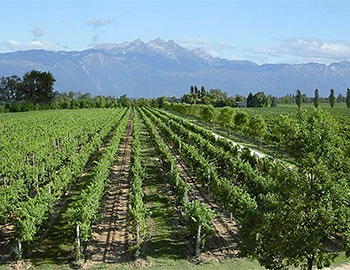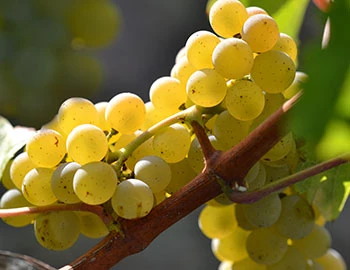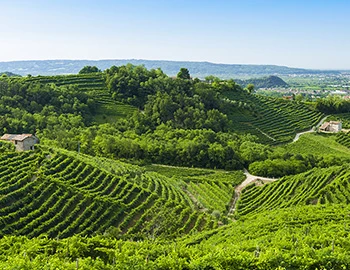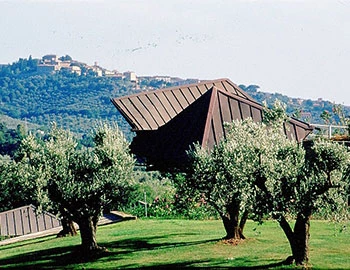attimo Sauvignon Blanc 2023
DOC, Paladin, 750 ml

| Grape variety: | Sauvignon Blanc |
| Producer: | Paladin |
| Origin: | Italy / Veneto |
Description
Fresh and exhilarating, this uncomplicated wine from the north of Italy is all together delightful. Its flowery notes remind of orange tree flower and elder tree flower, its fruity aromas of citrus fruits and gooseberries. It is light, with a juicy acidity, a nice intensity and a slightly peppery touch in the finish.
Attributes
| Origin: | Italy / Veneto |
| Grape variety: | Sauvignon Blanc |
| Label: | Vegan |
| Ripening potential: | 1 to 3 years |
| Drinking temperature: | 10 to 12 °C |
| Food Pairing: | Apéro pastries, Calamari alla romana, Giant crevettes, grilled langoustines, Moules à la marinière, Mild Asian dishes, Vegetable flan, quiche |
| Vinification: | soft pressing, fermentation in steel tank |
| Harvest: | hand-picking, strict selection |
| Maturation: | in steel tank, bâtonnage, some months bottle storage before sale |
| Bottling: | filtration |
| Volume: | 13.0 % |
| Note: | Contains sulphites |
Paladin
The vineyards of the Paladin winery are located in the border area between the Eastern Veneto and Friuli, where wine was already being grown in Roman times. At that time, the wines of this area were shipped in amphorae from the nearby sea ports to Rome, as reported by the historian Pliny.
The company was founded 50 years ago by Valentino Paladin, and today is jointly managed by his three children: Lucia, Carlo and Roberto.
The calcareous clay soils were formed about 20,000 years ago, after the last ice age. At a depth of 50 to 100 centimetres, one runs into limestone, the so-called Caranto, which gives the wines their body, richness and flavour intensity. The region has a rather mild climate. To the north, the Dolomites and the Alps provide protection from the cold; to the south-east, the Adriatic has a moderating influence.

Sauvignon Blanc
The Sauvignon blanc can be recognized with your eyes closed. Its typical bouquet is marked by green notes: freshly cut grass, tomato bunches, gooseberry. Citrus fruits, cassis and flint join into the mix. In warmer latitudes it also shows exotic aromas, such as passion fruit. Its acidity is decidedly lively. In all likelihood, it comes from the Loire Valley, where it is vinified in Pouilly-Fumé and Sancerre in its purest form: varietally, and without timber. In the 18th century, it found its way to Bordeaux. Ambitious producers assemble it there with Sémillon into substantial whites, which are aged in oak barrels. The Sauvignon blanc has been a sensational success in the past 20 years in New Zealand. With its refreshing sweet-and-sour style, winemakers from down under have conquered the world. The rich Sauvignons from Styria and crisp examples of South Tyrol and Friuli are worth mentioning as well. It pairs with anything from the sea. Or do it like they do on the Loire, and enjoy it with goat cheese.

Sauvignon Blanc
The Sauvignon blanc can be recognized with your eyes closed. Its typical bouquet is marked by green notes: freshly cut grass, tomato bunches, gooseberry. Citrus fruits, cassis and flint join into the mix. In warmer latitudes it also shows exotic aromas, such as passion fruit. Its acidity is decidedly lively. In all likelihood, it comes from the Loire Valley, where it is vinified in Pouilly-Fumé and Sancerre in its purest form: varietally, and without timber. In the 18th century, it found its way to Bordeaux. Ambitious producers assemble it there with Sémillon into substantial whites, which are aged in oak barrels. The Sauvignon blanc has been a sensational success in the past 20 years in New Zealand. With its refreshing sweet-and-sour style, winemakers from down under have conquered the world. The rich Sauvignons from Styria and crisp examples of South Tyrol and Friuli are worth mentioning as well. It pairs with anything from the sea. Or do it like they do on the Loire, and enjoy it with goat cheese.

Veneto
Veneto: land of the Amarone and Prosecco
Veneto stretches from the Alpine foothills, through the flat Po Valley, to the Gulf of Venice on the Adriatic coast. Two types of wine in particular have been able to celebrate spectacular successes here in recent years: Amarone growths impress with their opulent body and force, while the cheerfully bubbling Proseccos please with their fruity, grape freshness. But the region also produces drinkable everyday wines, including the white Soave and the red Bardolino.

Italy
Italy – Where wine is a way of life
The Italian wine regions are extremely diverse, and this is made clear in their wines. Established varieties such as Merlot, Syrah, and Sauvignon can be found on just 15 percent of the total vine growing area. The remaining 85 percent is reserved for autochthonous, indigenous varieties. More than 2,000 different grape varieties are grown under diverse conditions and pressed with various techniques into wines that reach the top tier of the international wine market.



